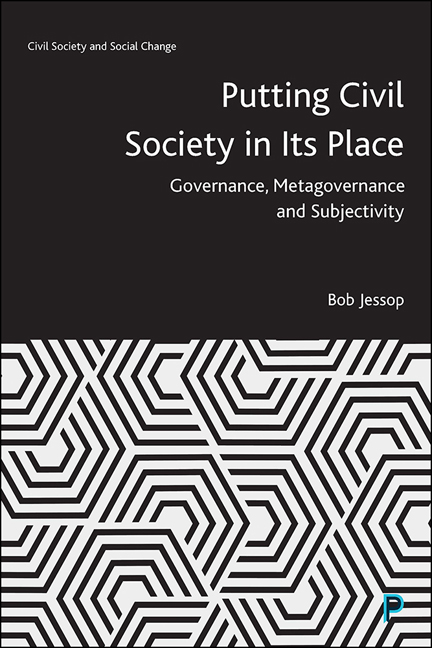Book contents
- Frontmatter
- Dedication
- Contents
- List of Tables and Figures
- Abbreviations
- Note on the Author
- Acknowledgements
- Licensing Information
- Preface
- 1 Introduction
- Part I Complexity, Contingency and Governance
- Part II Locating Civil Society as a Mode of Governance
- Part III Governance Failure and Metagovernance
- Endnotes
- References
- Index
7 - Locating civil Society in Foucault
Published online by Cambridge University Press: 18 March 2021
- Frontmatter
- Dedication
- Contents
- List of Tables and Figures
- Abbreviations
- Note on the Author
- Acknowledgements
- Licensing Information
- Preface
- 1 Introduction
- Part I Complexity, Contingency and Governance
- Part II Locating Civil Society as a Mode of Governance
- Part III Governance Failure and Metagovernance
- Endnotes
- References
- Index
Summary
As highlighted in Chapters 1–4 and elsewhere, there is no broad agreement on the concept of civil society. Its scope ranges from Enlightenment thinking to the critical perspectives put forward by Marx, Gramsci, Foucault and critical theorists. This chapter focuses on Foucault's view of civil society not as a historical given but as a mode of governance associated with changes in governmentality. In this regard, I distinguish Foucault's approach from the work of Anglo-Foucauldians, who refused to consider the state as the centre of control by political agents or classes in the exercise of power, legitimate or otherwise. Instead, they focused on the programmes and rationalities of government that work across multiple alliances between different actors – including those of the public sector, communities and community organizations, businesses and firms, and citizens themselves – and that enjoin these agents to take on certain forms of self-government and responsibility (Dean and Villadsen, 2016: 2). It is ironic, perhaps, that Foucault's Anglo-Foucauldian inheritors should end up favouring civil society politics over a state-based one, not least because Foucault himself was not only state-phobic but also suspicious of political action based on civil society (Dean and Villadsen, 2016: 3).
Foucault beyond Anglo-Foucauldianism
Building on Foucault's work, neo-Foucauldian scholars in the UK, Australia, Canada and the US contributed to what they called the ‘Foucault effect’. Identified by Graham Burchell, Colin Gordon and Peter Miller (1991), the ‘Anglo-Foucauldian’ school is associated with scholars from these four countries. Peter Miller and Nikolas Rose, two of its key figures, write that it comprises ‘an informal thought community that seeks to craft some tools through which to understand how our present had been assembled’ (Miller and Rose, 2008: 8). Anglo-Foucauldians do not aim to be Foucault scholars but selectively1 apply his initial insights on governmentality to new areas. They draw on Discipline and Punish (1977 [1975]) and the lecture on government from his 1977–78 course at the Collège de France, which appeared in English in 1979 (Foucault, 1979a; see also Foucault, 1991).
- Type
- Chapter
- Information
- Putting Civil Society in Its PlaceGovernance, Metagovernance and Subjectivity, pp. 137 - 152Publisher: Bristol University PressPrint publication year: 2020

